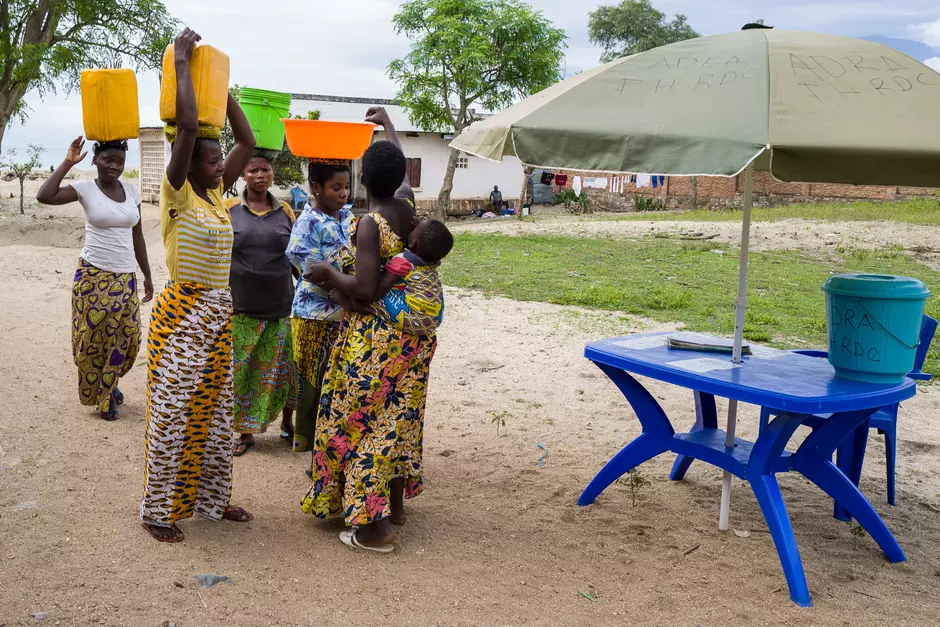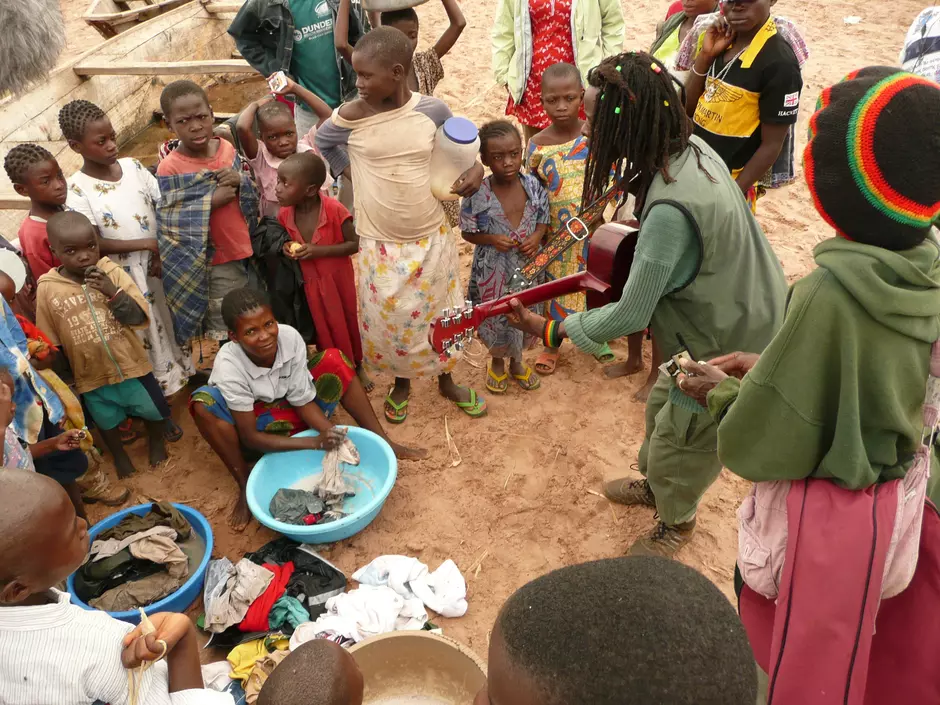The city of Uvira, in eastern Democratic Republic of Congo (DRC), has been identified as a cholera transmission hotspot. To stem the spread of the disease, the "Water Against Cholera in Uvira" project was launched in 2015 to improve water supply services. In late January, a workshop was held in Kinshasa, capital of the DRC, to assess the impact of water supply infrastructure improvements on cholera and other diarrheal diseases in Uvira.
Cholera remains a major health issue worldwide, affecting populations with limited access to safe drinking water and sanitation facilities. The Democratic Republic of Congo (DRC) is one of the most affected countries, with the majority of cases concentrated in the east of the country, in the Great Lakes Region. The town of Uvira, in South Kivu Province, has been identified as a hotspot for cholera transmission.
The city of Uvira has 280,000 inhabitants and stretches along the shores of Lake Tanganyika. The drinking water supply network of Uvira dates from the colonial era and was severely damaged during the First Congo War (1996-97). Before 2018, the network coverage estimates varied between 10% and 31% of the population. Furthermore, the humanitarian situation in Uvira is unstable as persistent conflicts in the region have caused insecurity and population movement (1).

The Global Task Force on Cholera Control (GTFCC), initiated by WHO, has set a goal of eliminating cholera by 2030 by focusing on three main areas, including targeted prevention measures to improve access to water, sanitation and hygiene services in cholera hotspots. Therefore, to improve water supply services in Uvira, the "Water against Cholera in Uvira" project was launched in 2015 and has been focused on the following activities (1):
- Construction of a new reservoir (2,000 m3)
- Rehabilitation of the Mulongwe treatment and pumping station to increase capacity
- Rehabilitation (10 km) and extension of the network pipes (24 km)
- Installation (or rehabilitation, depending on the situation) of private connections (2,368 completed, 2,997 planned) and construction of new standpipes (93 completed, 115 planned)
The project was managed by Regideso and financed by the French Development Agency, the Veolia Foundation, the European Union and Oxfam GB, with a total investment of over 15 million euros (1).
The structural improvement program
Significant investments have been made to improve the water supply, production and distribution infrastructure in Uvira. This has resulted in a significant increase in access to water between 2019 and 2021. However, the quantity of water available and service continuity have remained satisfactory. The gaps between infrastructure improvements and water supply quality were due to several difficulties (1):
- Limited production capacity during the April 2020 floods
- Lack of improved power supply (resulting in intermittent service)
- Implementation challenges that prevented the new reservoir from being commissioned at full capacity
- Sub-optimal system operation by staff
These results highlight the need for cross-sectoral coordination (water, electricity, land use) to implement such complex infrastructure projects. They also highlight the need for sufficient and qualified human resources to ensure adequate operation of the infrastructure (1).
Overview of the study conducted
To measure the progress in Uvira, an indicator was defined to characterize the quality of the water supply service. The indicator was based on water accessibility, availability, continuity and affordability, which were analyzed between January 2017 and December 2021. These four parameters were then integrated to establish a single indicator to describe the evolution of the quality of the water supply service over time, which could be integrated into subsequent epidemiological analyses (2).

Rigorous studies of the impact of improved water supply on endemic cholera transmission in low-income urban settings are lacking. To address this research gap, researchers from the London School of Hygiene and Medicine (LSHTM) have taken up this issue in collaboration with the Ministry of Public Health and Regideso, with the support of AFD, the Veolia Foundation and Oxfam (1).
A clinical surveillance system was established by the LSHTM based at the cholera treatment center (CTC) at Uvira General Hospital and the cholera treatment unit (CTU) at Kalundu Health Center (since 2019). Cases of diarrhea or cholera admitted to these health facilities were systematically recorded and mapped to 16 clusters. An epidemiological analysis was conducted from January 2017 to December 2021 on all patients with diarrheal diseases presenting at one of the two referral centers. A total of 4,556 cases of diarrheal disease were treated in Uvira during this period, with a cholera confirmation rate of 45.4% (1).
It appears that infrastructure improvements alone did not have a significant effect on the incidence of diarrheal disease or cholera. However, the quality of the water supply service available to the population was fundamental to reduce the burden of diarrheal disease and cholera. A decrease in the incidence of diarrhoeal diseases and confirmed cases of cholera was observed in connection with the improved quality of the water supply service (1).
Among all components of the service quality index, the strongest association was observed between continuity and confirmed cholera cases. A statistically significant association was also observed between the amount of water available and the incidence of confirmed cholera cases. By contrast, no statistically significant association was observed with accessibility alone or with the affordability parameter (1).
Overall, these results confirm that improving water supply service can help to reduce the incidence of these diseases (1). These findings also correlate with a previous LSHTM study showing a clear association between reduced tap water availability and increased cholera incidence in Uvira (1).
---
Whole-genome sequencing and phylogenetic analyses of V. cholerae in the region
To understand the dynamics of cholera transmission and the evolution of V. cholerae in the region, a study analyzed 96 V. cholerae O1 isolates collected between 2015 and 2020 in DRC (86 clinical isolates) and Tanzania (10 environmental isolates). These isolates were subjected to antibiotic susceptibility testing, whole-genome sequencing, comparative genomics, and phylogenetic analyses within a global collection of 1,366 seventh pandemic V. cholerae O1 genomes, including an additional 130 genomes from DRC (1998-2020) (3).
From 2001 to 2020, cholera outbreaks in eastern DRC were caused exclusively by the T10 sublineage of V. cholerae O1, which was introduced into East Africa from South Asia in the late 1990s. One clade became predominant after acquiring a mutation associated with reduced sensitivity to ciprofloxacin. The emergence of this antibiotic-resistant clade underscores the need for more systematic documentation of antibiotic use, particularly in the response to cholera outbreaks. To improve the effectiveness of interventions, these results also highlight the need for continuous genomic surveillance and coordinated communication between countries in the Lake Tanganyika basin (4).
REFERENCES
- Evaluation de l’impact sur les maladies diarrhéiques de l’amélioration de l’approvisionnement en eau de la ville d’Uvira, République Démocratique du Congo - Rapport final. London School of Hygiene and Tropical Medicine, Zone de Santé d’Uvira. Disponible sur demande.
- M. Gaiffe, C. Dross, E. Bwenge Malembaka, I. Ross, O. Cumming, K. Gallandat. A fuzzy inference-based index for piped water supply service quality in a complex urban setting with endemic cholera. En cours de révision. Disponible sur demande.
- Jeandron A, Saidi JM, Kapama A, Burhole M, Birembano F, Vandevelde T, et al. Water Supply Interruptions and Suspected Cholera Incidence: A Time-Series Regression in the Democratic Republic of the Congo. Brocklehurst C, editor. PLOS Medicine. 2015 Oct 27;12(10):e1001893.
- Hounmanou YMG, Njamkepo E, Rauzier J, Gallandat K, Jeandron A, Kamwiziku G, et al. Emergence of a seventh pandemic Vibrio cholerae O1 multidrug-resistant clade in the Lake Tanganyika basin. Emerging Infectious Diseases. 2023.
Conclusion
These results highlight the importance and challenges of improving water supply infrastructure to control and prevent cholera and other diarrheal diseases. To have an impact on diarrheal diseases, infrastructure improvement programs must ensure high quality execution and implementation, i.e., ensure that interventions improve the services available to the population. The research platform established in Uvira will also enable significant advances in both understanding cholera dynamics in an endemic region and targeted responses to support cholera elimination efforts.
OTHER PUBLICATIONS FROM THE PROJECT
Aurélie Jeandron, Oliver Cumming, Baron Bashige Rumedeka, Jaime Mufitini Saidi, Simon Cousens. Confirmation of cholera by rapid diagnostic test amongst patients admitted to the cholera treatment Centre in Uvira, Democratic Republic of the Congo. PLOS ONE (2018) 13:e0201306. https://doi.org/10.1371/journal.pone.0201306.
Aurélie Jeandron, Oliver Cumming, Lumami Kapepula, Simon Cousens. Predicting quality and quantity of water used by urban households based on tap water service. NPJ Clean Water 2, 23 (2019). https://doi.org/10.1038/s41545-019-0047-9
Camille Williams, Oliver Cumming, Lynn Grignard, Baron Bashige Rumedeka, Jaime Mufitini Saidi, Daniel Grint, Chris Drakeley, Aurélie Jeandron. Prevalence and diversity of enteric pathogens among cholera treatment centre patients with acute diarrhoea in Uvira, Democratic Republic of the Congo. BMC Infectious Diseases 20, 741 (2020). https://doi.org/10.1186/s12879-020-05454-0
Karin Gallandat, Aurélie Jeandron, Ian Ross, Jaime Mufitini Saidi, Baron Bashige Rumedeka, Vercus Lumami Kapepula, Simon Cousens, Elizabeth Allen, Amy MacDougall, Oliver Cumming. The impact of improved water supply on cholera and diarrhoeal diseases in Uvira, Democratic Republic of the Congo : a protocol for a pragmatic stepped-wedge cluster randomised trial and economic evaluation. Trials (2021) 22-408. https://doi.org/10.1186/s13063-021-05249-x.
AFD Policy Brief, 2021. Karin Gallandat, Pierre-Yves Durand, Thierry Vandevelde, Jaime Saidi. L’approvisionnement continu en eau, décisif contre le choléra. https://www.afd.fr/fr/ressources/approvisionnement-eau-cholera?origin=/fr/ressources-accueil?query=%2A&filter%5B1%5D=collection_k%3DPolicy%20Brief
